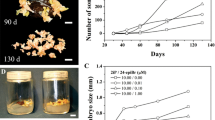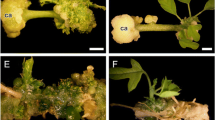Abstract
Brassinosteroids are known to promote cell elongation in a wide range of plant species but their effect on cell division has not been as extensively studied. We examined the effect of brassinolide on the kinetics and final division frequencies of regenerating leaf mesophyll protoplasts of Petunia hybrida Vilm v. Comanche. Under optimal auxin and cytokinin conditions, 10–100 nM brassinolide accelerated the time of first cell division by 12 h but had little effect on the final division frequencies after 72–120 h of culture. One micromolar brassinolide showed the same acceleration of first cell division but inhibited the final division frequency by approximately 20%. Under sub-optimal auxin conditions, 10–100 nM brassinolide both accelerated the time of first cell division and dramatically increased the 72- to 120-h final division frequencies. Isolated protoplasts may provide a useful model system to investigate the molecular mechanisms of brassinosteroid action on cell proliferation.
Similar content being viewed by others
Author information
Authors and Affiliations
Additional information
Received: 1 December 1997 / Revision received: 13 February 1998 / Accepted: 24 April 1998
Rights and permissions
About this article
Cite this article
Oh, MH., Clouse, S. Brassinolide affects the rate of cell division in isolated leaf protoplasts of Petunia hybrida. Plant Cell Reports 17, 921–924 (1998). https://doi.org/10.1007/s002990050510
Issue Date:
DOI: https://doi.org/10.1007/s002990050510




